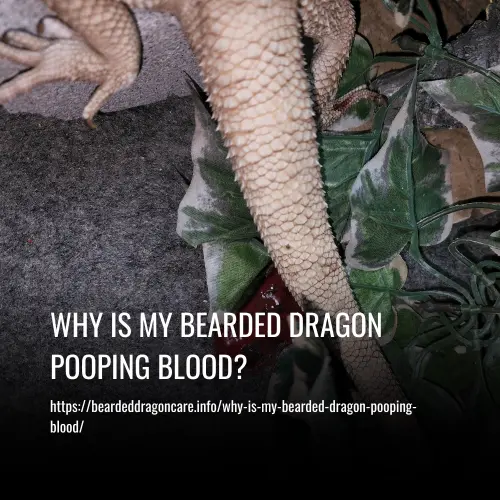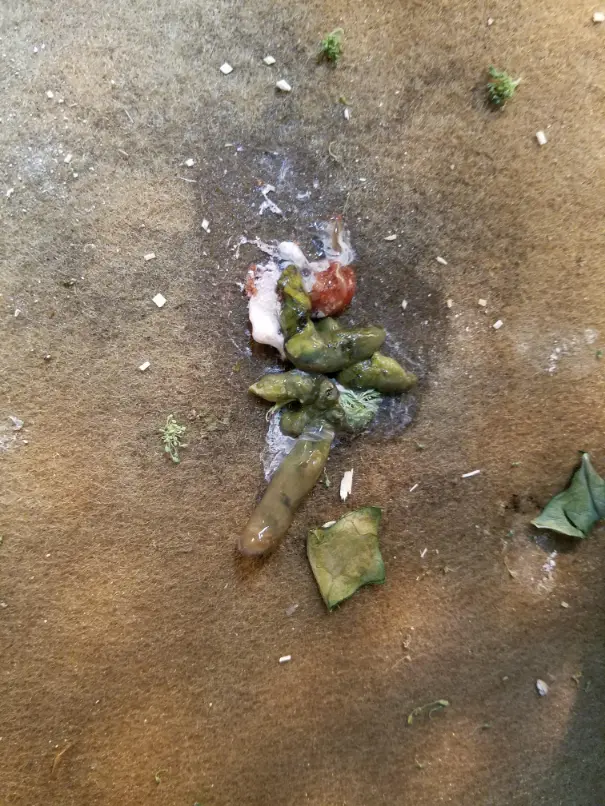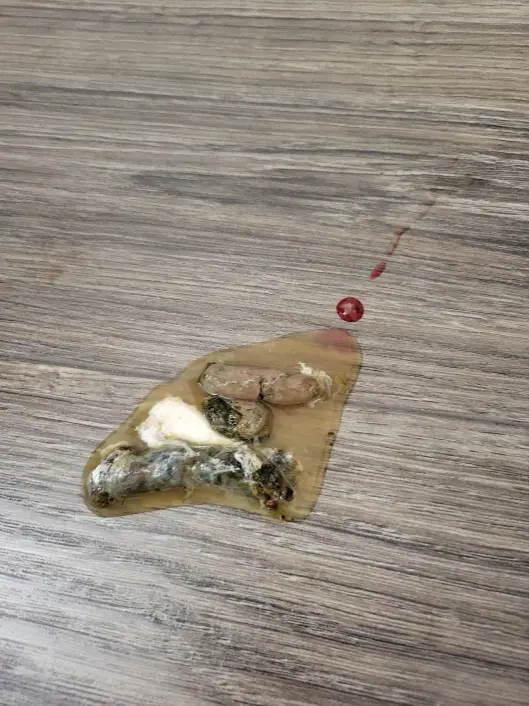If you’ve recently noticed blood in your bearded dragon’s droppings, don’t panic. While it can be alarming, seeing blood in your pet’s feces isn’t necessarily a sign that they’re suffering from a serious medical condition or illness – there are several potential causes.
The first step is to identify the root cause of the problem so you can create an appropriate treatment plan for your pet. But before any of that, let’s review what could be causing your bearded dragon to poop blood.
In this article, I’ll explain possible causes for why your beardie might be pooping red and provide advice on how you can take care of them.

Why Is My Bearded Dragon Pooping Blood
If your bearded dragon’s poo contains blood, it is a sign that something could be seriously wrong. Unsurprisingly, the most likely reason behind it is a parasitic infection known as coccidia. This nasty bug can cause runny and bloody stools, as well as dehydration, weight loss, and even incontinence if it’s left untreated.
It is clear then that if you face this problem with your beloved reptile pet then there is an urgent need to seek medical help and treat it efficiently. Don’t wait too long because the longer you wait, the worse the outcome can be for your bearded dragon!
What Does A Normal Bearded Dragon Poop Look Like?
If you own a bearded dragon, you’ll want to know what their normal poop should look like. Generally, it should have two parts: solid-digested food waste and soft yellowish-white urates. Urates is urine in solid form and sometimes you might see some clear pee as well, although it shouldn’t be much.
Be sure to keep an eye out for any changes in your dragon’s poop. If the stool is smaller than usual or there is no brown food waste, or if it looks watery or a different color, this can indicate possible internal issues that need to be addressed by your vet.
Abnormal Bearded Dragon Poop Colors
If your Bearded Dragon’s poop looks like something other than the typical white and brown combination, you might be wondering what gives. The truth is there are many possible explanations behind some of the abnormal bearded dragon poop colors that you may encounter.
These strange shades, ranging from red to green and even yellow, all point to various underlying issues with your pet’s digestive health. To learn more about abnormal bearded dragon poop colors, keep reading! To make sure that everything is alright with your pet’s overall health, seek answers from your nearest reptile veterinarian

Bearded Dragon Poop Color Chart
Bearded dragons can have a variety of different colored droppings, ranging from white to yellow to green. While some colors are normal, others may indicate a health issue that needs to be addressed. Here is a bearded dragon poop color chart to help you identify what’s normal and what’s not:
| Poop Color | Meaning |
| White and brown | Normal |
| Bloody or red | Parasites, impaction, or dye from red foods |
| Black | Too many insects eaten compared to greens |
| Chalky white | Dehydration |
| Yellow | Too much calcium in the diet |
| Green | Dye from green foods |
Blood in Bearded Dragon Poop
Bearded dragons are known for their lovely shades of yellow and red. But, if you notice a bright red color in your dragon’s poop, it could be the sign of something more sinister. It might mean that there is blood in your bearded dragon’s stool.
When this happens, blood may show up as a dark brownish tinge in the mix of yellow mucus that is typically found when bearded dragons excrete waste. If you believe there may be blood present in your bearded dragon’s stool, it’s important to seek medical advice as soon as possible to ensure that it isn’t linked to any serious medical condition.
What Does It Mean When Your Bearded Dragon Poops Out Blood?
If your bearded dragon is pooping out blood, this is a sign that something is wrong with its health. It could be an infection, parasites, or an imbalanced diet—none of which you want to mess around with. That’s why it’s important to take them to the vet right away to get the proper diagnosis and treatment.
In addition to that, it’s important to keep an eye on your beardie’s diet so that they are getting enough protein, calcium, vitamins, and minerals, as well as enough water and regular exercise. Knowing what their feces look like can also give you some clues as to their general health too; if there’s a change in the color or consistency from normal then that’s another warning sign that should be checked out by a professional.
When you see blood in your bearded dragon’s poop, it can be concerning. Blood in the stool could indicate a bacterial or parasitic infection or could be an indicator of internal bleeding due to blockage or constipation. It can also result from eating red-dye foods such as beets and raspberries, or if they develop creps which cause traces of feces to appear bloody.
Regardless of the cause, it is important to take action immediately to determine what is causing the problem. Your vet can perform a stool test for parasites such as Salmonella and pinworms that may have infiltrated your dragon’s system. Additionally, factors such as age, diet, environment, and stress levels can affect their digestive system and how often they poop – adults tend to poop more frequently than younger dragons. By tracking changes in your pet’s poops closely you can help prevent illnesses that could endanger your beardie’s health.
What Causes Bearded Dragons To Bleed Internally?
Bearded dragons can experience internal bleeding and the causes are various. Parasites like coccidia, ingestion of sharp-shelled and -legged insects, bacterial infections from eating unclean veggies, dehydration due to lack of water, or trauma such as falling off a high perch or being attacked by another animal can all lead to blood in your dragon’s poop.
Though the red color in poop sometimes suggests fruit they’ve eaten such as raspberries, it’s best to confirm that it’s indeed blood after observing it for several days. It’s also important to keep fresh water available in the cage at all times to prevent dehydration which may cause vomiting and bloody stools.
Additionally, if you ever spot any blood on their tail when they go outside for the day, this could be a sign of internal bleeding and an immediate visit to the vet is necessary. Do also clean up thoroughly if there’s any sign of blood on the inside or outside of their enclosure as this might attract predators like rodents that may cause harm to your beardie.
What if My Bearded Dragon is Pooping Blood?
If your bearded dragon is pooping blood, it’s essential to take action quickly. Although minor constipation is a possible cause of the red stool, there could also be more serious health issues at stake. Be sure to keep an eye out for lumps or bumps on your pet’s underside and pay close attention to their back legs too –– paralysis of the limbs could be one of the symptoms associated with impaction.
Impaction can be a life-threatening issue if it’s left unchecked and untreated, which is why it’s important to know the common causes. The improper substrate or feeding your pet too-large feeders are two potential culprits behind this condition in bearded dragons.
It’s likely that any bloody stool from your pet is indicative of impaction, but if you can confirm that this isn’t the case then internal injury or simply larger bowel movements may be causing their symptoms. Don’t ignore it –– get help for your beloved reptile!

Bearded Dragon Bloody Stools: Treatment
Treating a bearded dragon that is exhibiting bloody stools requires understanding the possible causes. In some cases, the blood may actually be red food coloring due to improper diet or eating something brightly colored like beets or raspberries. If this is the case, changing your dragon’s diet can remedy the issue.
However, in some cases, the presence of blood could be an indication of a more serious problem such as a parasitic infection like coccidia, pinworms, or hookworms. If these parasites aren’t treated immediately and effectively, it can lead to serious health issues for your dragon such as dehydration, weight loss, and even incontinence in extreme cases.
If you suspect that your dragon has a parasitic infection, it’s important to consult with your veterinarian right away as they will be able to properly diagnose and treat whatever issue is causing the bloody stools. Appropriate treatment can help clear up any infections and get your beloved pet back on track so they can enjoy life once again!
What If They’re Not Impacted Though?
If you suspect that your bearded dragon may be suffering from impaction, it’s important to keep a close eye on its behavior for the next couple of days. Monitor their movements and try to collect a stool sample just in case. If no improvement is observed in 48 hours, then it’s best to take them to the vet for a full evaluation.
In addition, if you notice that your dragon is bleeding from their vent, then immediate medical help should be sought as this can often be indicative of more serious issues such as egg binding or prolapse. Therefore, it’s always smart to get them checked out by a qualified veterinarian if there are any signs that something may be wrong.
Blood in a bearded dragon’s poop and struggle to poop
If you’ve noticed your bearded dragon struggling to poop or their poop containing small amounts of blood, this could be a sign that something is amiss. It might be due to larger-than-normal meals, constipation, or even the presence of a polyp in the intestines – whatever it is, there are several potential causes for concern.
Very large meals can cause discomfort when it comes time for your bearded dragon to pass them out of its system, while constipation can lead to extremely dry stools, which in turn can cause tears and bleed in the area. Meanwhile, polyps may take up space in the intestines and make it difficult for your pet to do its business without struggle and pain. Dehydration will also result in dry poop and an effort expended in pushing could bring about tears that would release blood into the stool.
The good news is that many of these issues (food/dietary related ones) are relatively easy to rectify; adding more fiber-rich foods and ensuring proper hydration can help prevent large and dry stools from happening whilst mitigating constipation. Still, if you notice signs of distress during pooping from your beloved Bearded Dragon, ensure that you get it checked out professionally as soon as possible.
Conclusion:
It is important to take your bearded dragon to the vet if they are pooping blood as soon as possible. Blood in their stool can be caused by a variety of issues, including parasites, bacterial or viral infections, or trauma. Your vet will do an exam and tests to determine the cause and prescribe the appropriate treatment.
Proper husbandry plays an important role in preventing any health issues and should always incorporate veterinary care when needed.


